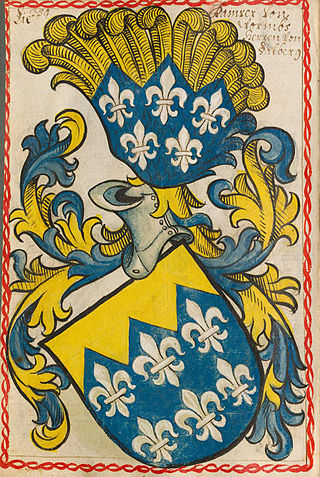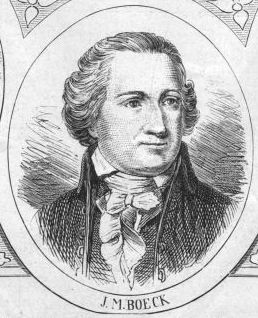
Dietrich Fischer-Dieskau was a German lyric baritone and conductor of classical music, one of the most famous Lieder performers of the post-war period, best known as a singer of Franz Schubert's Lieder, particularly "Winterreise" of which his recordings with accompanists Gerald Moore and Jörg Demus are still critically acclaimed half a century after their release.

Peter Winter, later Peter von Winter, was a German violinist, conductor and composer, especially of operas. He began his career as a player at the Mannheim court, and advanced to conductor. When the court moved to Munich, he followed and later became kapellmeister of the opera there. His opera Das Labyrinth, a sequel to Mozart's Die Zauberflöte, was premiered in Vienna in 1798, and his Maometto at La Scala in Milan in 1817. His work has been regarded as a bridge between Mozart and Weber in the development of German opera.

Dalberg is the name of an ancient and distinguished German noble family, derived from the hamlet and castle of Dalberg or Dalburg, near Kreuznach in Rhineland-Palatinate.
The Bavarian State Orchestra is the orchestra of the Bavarian State Opera in Munich, Germany. It has given its own series of concerts, the Akademiekonzerte, since 1811.
Vinzenz Lachner was a German composer and conductor.

Johann Michael Böck or Boeck was a German actor.
Johann Ignaz Ludwig Fischer, commonly called Ludwig Fischer, was a German opera singer, a notable bass of his time.

Günther von Schwarzburg is a Singspiel in three acts by Ignaz Holzbauer set to a German libretto by Anton Klein. Loosely based on events in the life of the 14th-century German king, Günther von Schwarzburg, the opera premiered on 5 January 1777 at the Hoftheater in the Mannheim Palace.

Heinrich Christian Beck was a German actor and playwright.

Wolfgang Heribert Kämmerer von Worms Freiherr von Dalberg was a courtier and statesman of Baden, who served as Minister of State and Grand Master of the Household. He was also the first general administrator of the Mannheim National Theatre.

Friederike Sophie Seyler was a German actress, playwright and librettist. Alongside Friederike Caroline Neuber, she was widely considered Germany's greatest actress of the 18th century; Gotthold Ephraim Lessing described her in his Hamburg Dramaturgy as "incontestably one of the best actresses that German theatre has ever seen."

The Hamburg Enterprise, commonly known as the Hamburg National Theatre, was a theatre company in Hamburg, that existed 1767–1769 at the Gänsemarkt square, and that was led by Abel Seyler. It was the first attempt to establish a national theatre in Germany. It was modelled after Det Kongelige Teater, founded by Ludvig Holberg in Denmark in 1748. Its leading actor was Konrad Ekhof and the theatre employed Gotthold Ephraim Lessing as the world's first dramaturg; Lessing's influential Hamburg Dramaturgy, based on his work at the Hamburg National Theatre, defined the new field of dramaturgy and also introduced the term. The theatre premiered Lessing's Minna von Barnhelm on 30 September 1767.

Abel Seyler was a Swiss-born theatre director and former merchant banker, who was regarded as one of the great theatre principals of 18th century Europe. He played a pivotal role in the development of German theatre and was considered "the leading patron of German theatre" in his lifetime. He supported the development of new works and experimental productions, helping to establish Hamburg as a center of theatrical innovation and to establish a publicly funded theater system in Germany. He is credited with introducing Shakespeare to a German language audience, and with promoting the concept of a national theatre in the tradition of Ludvig Holberg, the Sturm und Drang playwrights, and serious German opera. Already in his lifetime, he was described as "one of German art's most meritorious men."

The Seyler Theatre Company, also known as the Seyler Company, was a theatrical company founded in 1769 by Abel Seyler, a Hamburg businessman originally from Switzerland who became "the leading patron of German theatre" in his lifetime. It was largely a continuation of the Hamburgische Entreprise, whose dramaturge was Gotthold Ephraim Lessing and whose main owner was Seyler. The Seyler theatrical company became one of the most famous theatrical companies of Europe in the 18th century, attracting some of Germany's leading actors, playwrights and composers. It originally comprised around 60 members, including an orchestra, a ballet, house dramatists and set designers. Between 1777 and 1778 Seyler employed some 230 actors, singers and musicians. The company was originally contracted by the Hanoverian court with performing at Hanover and other cities of the kingdom. The company would eventually perform all across Germany, and performed for three years at the Weimar Schlosstheater, invited by Duchess Anna Amalia of Brunswick-Wolfenbüttel. When Anna Amalia succeeded in engaging the Seyler Company, this was "an extremely fortunate coup. The Seyler Company was the best theatre company in Germany at that time." The company had an important role in the development of German opera in the late 18th century.

Phelim McDermott is an English actor and stage director. He has directed plays and operas in Britain, Germany, Spain, the United States, and Australia. McDermott was a co-founder of the Improbable theatre in 1996.

Otto Heinrich von Gemmingen zu Hornberg was a member of the aristocratic Gemmingen family. He was a diplomat and enlightenment writer, a Freemason and a friend of the composer Wolfgang Amadeus Mozart.

Anna Elisabeth Toscani, née Endemann, was a German actress. She was a student of Friederike Sophie Seyler and was one of the leading actresses of the Mannheim National Theatre from 1779 to 1784. She is also notable for being the first "Amalia" in the original performance of Friedrich Schiller's The Robbers on 13 January 1782 at Mannheim.

Wolfgang Rennert was a German conductor. He focused on opera, at the Oper Frankfurt, Staatsoper Berlin, Mannheim National Theatre and the Semperoper, among others. He premiered operas, such as Louise Talma's Die Alkestiade in Frankfurt, and Rainer Kunad's Sabellicus in East Berlin. Regarded as a specialist in Mozart, Wagner and Strauss, he was a guest conductor at international opera houses including the Royal Opera House in London, the San Francisco Opera and the Dallas Opera.
Johann Peter Ritter was a German composer, conductor, chorus master, and cellist born and died in Mannheim, Karlsruhe, Baden-Württemberg, Germany). He is best known in the United States for "Sun of My Soul" and "Holy God, We Praise Thy Name."
Peter Joseph Eschborn was a German composer, violinist and conductor.














